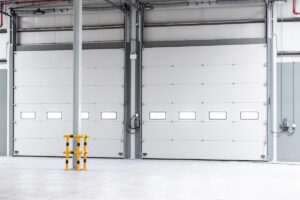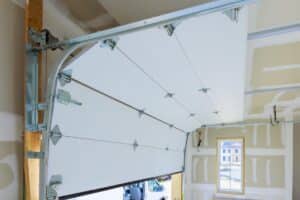Garage doors play a crucial role in our homes, providing security and convenience. However, they can also pose risks to our loved ones, especially children and pets. In this comprehensive guide, we will delve into the world of garage door safety, offering advice on childproofing and necessary precautions for families with pets.
Understand the Risks
When it comes to garage door safety, the first step is gaining a comprehensive understanding of the potential risks that are associated with these common household fixtures. It’s essential to recognize that garage doors, while convenient and functional, can pose significant dangers if not handled with care and awareness. Let’s delve deeper into the risks involved:
- Heavy Weight and Mechanical Parts: Garage doors are heavy and are often operated with the help of powerful motors and mechanical systems. A typical garage door can weigh hundreds of pounds, and any malfunction or mishandling can result in it falling unexpectedly, causing serious injuries or even fatalities.
- Pinch Points: Garage doors have numerous moving parts, including rollers, tracks, and hinges. These components can create pinch points where fingers, hands, or even clothing can get caught, leading to painful injuries or amputations in severe cases.
- Garage Door Springs: Torsion and extension springs are integral parts of garage door systems. These springs are under high tension and can be dangerous if they break or are mishandled during maintenance or repairs. A snapped spring can cause severe injuries.
- Lack of Visibility: Garage doors often obstruct the view of what lies beyond them. This limited visibility can be risky when backing out of the garage, as it increases the chances of accidents involving pedestrians, bicycles, or other vehicles.
- Carbon Monoxide Buildup: In attached garages, carbon monoxide from running vehicles can seep into the home if proper ventilation is not maintained. This odorless, deadly gas can be a silent threat to your family’s health.
- Entrapment: Children and pets can be particularly vulnerable to garage door accidents. They might not understand the dangers or know how to react if they find themselves trapped under a closing door. Vigilance is essential to prevent such scenarios.
- Theft and Home Security: A malfunctioning or left-open garage door can compromise the security of your home, making it an easy target for burglars and intruders. Understanding the security risks associated with garage doors is crucial to ensure your family’s safety.
- Environmental Hazards: Garages often house potentially hazardous materials like chemicals, sharp tools, or flammable substances. Failing to store these items safely can lead to accidents or even fires.
- Weather-Related Risks: Extreme weather conditions, such as hurricanes, tornadoes, or heavy snowfall, can pose risks to your garage door’s structural integrity. Understanding how to secure your garage door during severe weather can prevent costly damages.

This awareness will help you make informed decisions and implement the necessary safety measures to prevent accidents and injuries related to garage doors. Remember that knowledge is your best defense against these potential dangers, and it empowers you to create a secure environment for your loved ones.
Regular Maintenance and Inspection
Regular maintenance and inspection of your garage door are essential practices that can significantly contribute to its smooth operation and, most importantly, the safety of your family and pets. Neglecting these crucial tasks can lead to unexpected malfunctions, accidents, and costly repairs. Here’s a closer look at the importance of regular maintenance and how to go about it:
- Lubrication: One of the simplest yet most effective maintenance tasks is keeping all moving parts well-lubricated. Regularly apply a high-quality garage door lubricant to the rollers, hinges, tracks, and springs. This reduces friction, minimizes wear and tear, and ensures that the door operates smoothly.
- Visual Inspection: Perform a visual inspection of your garage door and its components at least once a month. Look for signs of wear and damage, such as frayed cables, loose bolts, or misaligned tracks. Address any issues promptly to prevent them from escalating into major problems.
- Testing the Balance: An unbalanced garage door can strain the opener and lead to premature wear. To test the balance, disconnect the opener and manually lift the door halfway. If it doesn’t stay in place or feels heavy, it may be unbalanced, and a professional should adjust the spring tension.
- Safety Sensor Check: Modern garage doors are equipped with safety sensors that prevent the door from closing if an object or person is detected in its path. Regularly check and clean these sensors to ensure they function correctly. Misaligned sensors can lead to accidents.
- Weatherstripping Inspection: Examine the weatherstripping around the garage door for signs of wear or damage. Weatherstripping helps maintain temperature control and keeps out dust and pests. Replace it if necessary to maintain insulation and energy efficiency.
- Opener Reversal Test: Test the automatic reversal feature of your garage door opener by placing a small object, like a block of wood, in the door’s path while closing it. The door should reverse immediately upon contact. If it doesn’t, seek professional assistance to fix the opener.
- Professional Inspection: While DIY maintenance is valuable, it’s advisable to schedule an annual professional inspection. Experienced technicians can identify potential issues that may go unnoticed during routine checks. They can also perform maintenance tasks that require special tools or expertise.
- Maintenance Checklist: Create a maintenance checklist, detailing the tasks and their frequency, to ensure nothing is overlooked. This organized approach helps you stay on top of garage door maintenance and safety.
- Documentation: Maintain a record of all maintenance and repairs performed on your garage door. This documentation can be helpful when tracking the door’s history and identifying recurring issues.

Regular maintenance and inspection are crucial for the safe and efficient operation of your garage door. By dedicating time to these tasks, you can extend the lifespan of your garage door, reduce the risk of accidents, and save money on costly repairs.
Childproofing Your Garage
Children are known for their boundless curiosity and sense of adventure. Unfortunately, these traits can lead them into potentially hazardous situations, especially in a place like a garage, where numerous dangers may lurk. Childproofing your garage is not only a matter of safety but also peace of mind for parents and caregivers. Here are some essential steps to ensure your garage is a secure environment for children:
- Locking Mechanisms: Install childproof locks or latches on garage doors to prevent children from gaining access without adult supervision. These locks can be a simple yet effective barrier to keep young explorers out.
- Store Hazardous Items Safely: Garages often house dangerous items such as tools, chemicals, pesticides, and sharp objects. Store these items in locked cabinets or high shelves that are out of reach of children. Consider using childproof locks on cabinets for added security.
- Secure Garage Door Openers: Children may be tempted to play with garage door openers, potentially causing accidents. Keep remote controls and wall-mounted control panels out of children’s reach, or lock them up when not in use.
- Eliminate Clutter: A cluttered garage can be a breeding ground for accidents. Keep the floor clear of toys, equipment, and debris that children might trip over. Creating a tidy and organized space reduces the risk of falls.
- Unplug Power Tools: When not in use, unplug power tools and keep them stored safely. Remove any batteries or power sources from cordless tools to prevent accidental activation.
- Educate Your Children: Teach your children about the dangers of the garage and why it’s essential to stay away from certain areas or objects. Use age-appropriate language and make them aware of potential hazards.
- Secure Heavy Items: Garages often store heavy items like bicycles, sports equipment, or gardening tools. Ensure that these items are secured or anchored properly to prevent them from toppling over onto a child.
- Garage Door Sensors: Test the garage door’s safety sensors regularly to ensure they are functioning correctly. These sensors can detect objects or people in the door’s path and prevent accidents.
- Proper Disposal of Hazardous Materials: Dispose of hazardous materials like old paint cans, chemicals, or batteries responsibly. Many communities have specific disposal guidelines for these items. Do not leave them accessible to children.
- Supervision: Always supervise children when they are in the garage. Even with childproofing measures in place, active supervision is the most effective way to ensure their safety.
- Emergency Plan: Instruct your children on what to do in case of an emergency, such as getting trapped in the garage. Teach them how to operate the emergency release mechanism on the garage door if needed.
- Regular Safety Drills: Practice safety drills with your children, so they know how to react in various situations. Include scenarios like a garage door malfunction or the presence of hazardous materials.

Childproofing your garage is not a one-time task; it’s an ongoing process that requires vigilance and adaptability as your child grows and develops. By following these precautions and instilling safety awareness in your children, you can create a garage environment that is both secure and conducive to their well-being. Ultimately, the goal is to strike a balance between exploration and safety, allowing your children to enjoy their surroundings while minimizing potential risks.
Pet Safety Measures
Our furry companions are cherished members of the family, and just like children, they require special consideration when it comes to garage door safety. Garages can harbor several hazards for pets, from moving doors to toxic substances. Here’s how you can create a pet-friendly environment and ensure their safety around your garage:
- Restricted Access: Limit your pet’s access to the garage when possible. If you can, designate it as a no-entry zone. This prevents them from wandering into potentially dangerous areas.
- Secure Garage Doors: Ensure that your garage doors are equipped with safety features like sensors that detect movement. This prevents the door from closing on your pet when they are near.
- Store Hazardous Items Safely: Just as you would with children, store hazardous items such as chemicals, pesticides, and sharp tools in locked cabinets or on high shelves. Ensure your pet cannot access these items.
- Check for Small Openings: Inspect your garage for small openings or gaps where your pet could squeeze through. Cats, in particular, are known for their ability to find these tiny escape routes.
- Use Pet Gates: Consider using pet gates to block off access to the garage entrance. This prevents your pet from accidentally wandering into the garage while you’re coming or going.
- Secure Trash Bins: Garages often contain trash bins that may contain tempting scraps or harmful items. Make sure trash bins are sealed or secured so that your pet cannot access them.
- Toxic Substances: Be aware of toxic substances that may be present in the garage, such as antifreeze, pesticides, or chemicals. Ensure these are stored securely and any spills are cleaned up immediately.
- Garage Door Opener Controls: Keep remote controls for garage door openers out of your pet’s reach. The buttons can be accidentally pressed, causing the door to close when your pet is nearby.
- Training: Train your pet to understand basic commands like “stay” and “come.” This can be especially helpful when preventing them from entering the garage or getting too close to moving doors.
- Regular Inspection: Perform regular inspections of your garage to identify any potential hazards or areas where your pet could get into trouble. Address these issues promptly.
- Supervision: Always supervise your pet when they are in or around the garage. This is particularly important when the garage door is in operation.
- Safety Accessories: Consider installing safety accessories like motion-activated lights in the garage. These can help alert you to your pet’s presence and enhance overall safety.
- Pet Identification: Ensure your pet has proper identification, such as a collar with an ID tag and a microchip. In case they do accidentally venture into the garage or escape, it can increase the chances of a safe return.
- Emergency Plan: Have a plan in place in case your pet gets trapped in the garage or encounters a dangerous situation. Know how to quickly release the garage door if needed.

By implementing these pet safety measures, you can provide a secure environment for your four-legged friends while minimizing the risks associated with the garage. Remember that prevention is key, and proactive steps can help ensure your pet’s well-being. A pet-friendly garage is a happy and safe space for your beloved companions to enjoy alongside the rest of the family.
Get Professional Installation
When it comes to installing a garage door, opting for professional installation is not just a choice; it’s a necessity. Garage doors are complex systems with numerous components that must be correctly assembled and calibrated for optimal performance and, most importantly, safety. Here are compelling reasons why trusting experts for this task is essential:
- Safety First: Garage doors are heavy and operate under high tension, particularly when it comes to the springs and cables. Improper installation can lead to accidents, injuries, and even fatalities. Professionals have the knowledge and experience to ensure that every component is installed correctly and safely.
- Adherence to Building Codes: Local building codes and regulations dictate specific requirements for garage door installations. These codes are in place to guarantee the safety of occupants and prevent accidents. Professional installers are well-versed in these codes and will ensure that your garage door complies with all relevant regulations.
- Proper Calibration: Garage door openers, springs, and tracks must be precisely calibrated to ensure the door’s smooth operation. A misalignment or miscalibration can lead to malfunctions and safety hazards. Professionals have the tools and expertise to calibrate these components accurately.
- Warranty Preservation: Many garage door manufacturers require professional installation to maintain the warranty on the door and its components. Attempting to install the door yourself or hiring an inexperienced installer may void your warranty, leaving you responsible for any future repairs or replacements.
- Avoiding Costly Mistakes: DIY installation attempts often result in costly mistakes that require professional intervention later on. These mistakes can include misaligned tracks, improperly tensioned springs, or damage to the door itself. Investing in professional installation from the start can save you time and money in the long run.
- Efficiency and Reliability: Professional installers have the experience to complete the installation efficiently and correctly. This means your garage door will operate smoothly, reliably, and with minimal maintenance requirements.
- Comprehensive Assessment: Before installation, professionals assess your garage and its surroundings to ensure that the chosen door is suitable for your specific needs and space. They can recommend the best type, size, and style of door to maximize functionality and safety.
- Enhanced Security: Garage doors are a crucial part of your home’s security system. Professional installers can ensure that your door is installed securely, reducing the risk of break-ins or unauthorized access.
- Peace of Mind: Knowing that your garage door has been professionally installed provides peace of mind for you and your family. You can trust that it will operate safely and reliably for years to come.
- Expertise in Troubleshooting: In case of any issues or malfunctions down the road, professional installers are well-equipped to diagnose and repair problems quickly. They understand the intricacies of garage door systems and can provide ongoing maintenance and support.

Professional installation of your garage door is a critical investment in the safety, security, and longevity of your home’s essential feature. While it may seem tempting to attempt a DIY installation to save money, the potential risks and complications far outweigh any initial cost savings. Trusting experts for this task ensures that your garage door meets safety standards, operates efficiently, and provides reliable performance for years to come.
Conclusion
Your family’s safety and security are our top priorities. If you have any questions or need assistance with garage door installation, maintenance, or safety measures, please don’t hesitate to contact us. Our team of experts is here to help you create a safe and functional garage space for your home. Your peace of mind is our ultimate goal. Contact us today to schedule a consultation or for any further assistance. Your loved ones and pets deserve nothing less than the highest level of protection and convenience in your garage.
FAQs
Garage doors pose risks such as heavy weight, pinch points, springs, limited visibility, carbon monoxide buildup, entrapment, and home security threats.
Install childproof locks, store hazardous items out of reach, secure garage door openers, and educate your children about garage dangers.
Limit their access, secure garage doors, store hazardous items safely, use pet gates, and supervise them when in the garage.
Professional installation ensures safety, adherence to building codes, proper calibration, warranty preservation, avoidance of costly mistakes, efficiency, and enhanced security.
Regularly lubricate moving parts, visually inspect for wear, test balance, check safety sensors, inspect weatherstripping, and perform opener reversal tests. Consider professional inspections and documentation.
Have an emergency plan in place, instruct your family on how to use the emergency release mechanism, and know how to release the door if necessary.
Knowledge empowers you to make informed decisions and implement safety measures, ensuring a secure environment for your loved ones.








